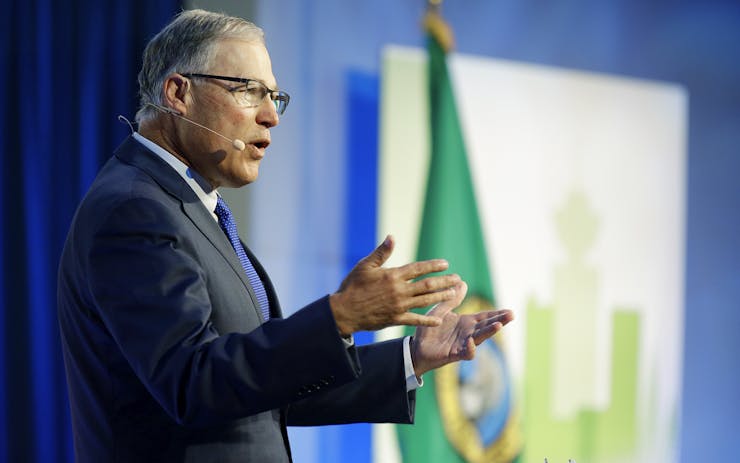Washington state Governor Jay Inslee was quick to defend his state’s legal cannabis industry in the wake of US Attorney General Jeff Sessions’ decision Thursday morning to rescind the Cole memo, an Obama-era Justice Department guideline that set a policy of federal noninterference with legal-cannabis states.
“As we have told the Department of Justice ever since I-502 was passed in 2012, we will vigorously defend our state’s laws against undue federal infringement.”
“In Washington state we have put a system in place that adheres to what we pledged to the people of Washington and the federal government,” Inslee said in a statement. “We are going to keep doing that and overseeing the well-regulated market that Washington voters approved.”
“Make no mistake,” Inslee added. “As we have told the Department of Justice ever since I-502 was passed in 2012, we will vigorously defend our state’s laws against undue federal infringement.”
Bob Ferguson, Washington state’s attorney general and a frequent courtroom opponent of the Trump administration, joined Inslee in that promise, pledging “to vigorously defend the will of the voters in Washington state.”
In Seattle, Mayor Jenny Durkan, a former US attorney, said she would instruct the Seattle Police Department not to cooperate with federal cannabis enforcement.
“Federal law enforcement will find no partner with Seattle to enforce the rollback of these provisions.”
“Let’s be clear: Our Seattle Police Department will not participate in any enforcement action related to legal businesses or small personal possession of marijuana by adults,” she said in a statement. “Federal law enforcement will find no partner with Seattle to enforce the rollback of these provisions.”
It would be difficult for federal agencies to pursue action against legal cannabis businesses without the aid of local law enforcement, as they depend heavily on joint task forces, but even without local cooperation, federal prosecutors could easily target individual businesses. However, some members of Washington’s legal cannabis industry say they’re more concerned about what this means for banking.
Ian Eisenberg, owner of well-known Seattle cannabis retailer Uncle Ike’s, said of course he was worried about criminal prosecution but was “most worried about how Salal will react.”
Salal Credit Union, one of the first financial institutions to work with the cannabis industry, now holds close to $40 million in cannabis assets, including those of Uncle Ike’s. Jeremy Moberg, president of CannaSol Farms, a state-licensed cannabis grower in Eastern Washington, echoed those concerns.
“I’ve kind of moved off cash and I’m all in the bank now. I’m kind of worried,” he said, “that my accounts could be frozen.”
Enforcement of federal cannabis laws in the absence of the Cole memo could vary greatly depending on policy priorities of individual US attorneys.
Sheryl Kirchmeier, Salal’s senior vice president of marketing, said there was no reason to worry just yet. “At this time, it’s business as usual. We’re really just waiting to see what potential impacts this may have, if any,” she said. “We’re still fully supportive of our members and wanting to the best for them.”
At the Washington State Liquor and Cannabis Board, it also appears to be business as usual. Many licensees are concerned that the Justice Department could compel the agency to release licensing records. The agency’s spokesperson, Brian Smith, said they were deferring to the governor’s office for an official statement, but he offered licensees a bit of assurance about day-to-day operations.
“Our director, Rick Garza, met with marijuana licensing staff earlier this morning,” he told Leafly. “He told them that if they hear questions from licensees, that they are to tell them that nothing has changed. [That] we will continue to adhere by the Cole memo, that we’ll keep processing their applications, that deadlines facing licensees still apply.”
As Leafly has reported, enforcement of federal cannabis laws in the absence of the Cole memo could vary greatly depending on policy priorities of individual US attorneys. The US attorney for the Western District of Washington, Annette L. Hayes, did not respond to a request for comment. An assistant for US Attorney Joseph H. Harrington, of the state’s Eastern District, said that her office had been instructed to direct all media inquiries to the DOJ’s national press office.
How federal enforcement would unfold in Washington is still anyone’s guess, although it’s worth noting that Harrington, in the Eastern District, was recently promoted to interim US attorney by Sessions himself, while Hayes is a holdover from the Obama era.
Despite being in Harrington’s district, which tends to be a more conservative area of the state, CannaSol’s Moberg isn’t ready to panic yet.
“Everybody’s freaking out. I’m not freaking out. Should I be? It’s hard to take the Trump administration very seriously. If it was Obama doing something like that, it would be like, ‘Holy shit, what changed?’—or any other president.”





